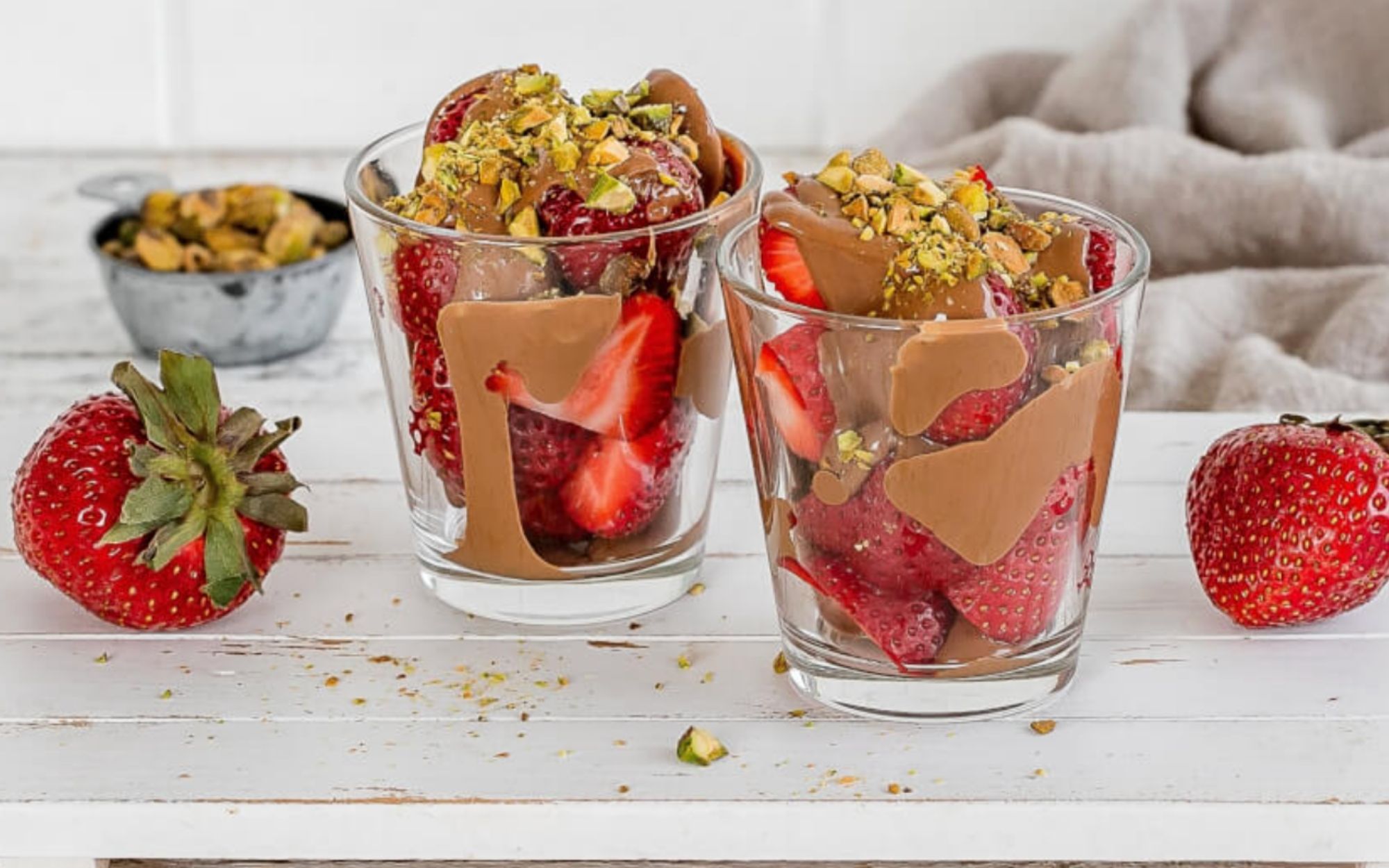Living with type 2 diabetes doesn’t mean giving up dessert forever. In fact, learning to create satisfying sweet treats that work with your body rather than against it is an essential skill for long-term health management. The challenge lies in finding options that provide genuine pleasure without the blood sugar roller coaster that follows traditional desserts.
When we crave sweetness, our instinct might be to reach for commercially prepared cookies, cakes, or ice cream. However, these processed desserts typically contain refined carbohydrates and added sugars that can cause dramatic blood glucose spikes and contribute to inflammation over time [1]. This is where thoughtful ingredient selection becomes crucial for those managing diabetes.
The Perfect Balance: Nutrition and Indulgence
Our Chocolate-Drizzled Strawberries with Pistachios exemplifies how a diabetes-friendly dessert can be both nutritionally sound and genuinely satisfying. This elegant treat relies on whole foods and strategic ingredient swaps to create a dessert that supports stable blood glucose while still delivering on flavor and satisfaction.
Strawberries form the foundation of this dessert, providing natural sweetness without excessive carbohydrates. Research shows that berries are particularly beneficial for people with type 2 diabetes due to their impressive nutritional profile. A cup of strawberries contains just 11 grams of carbohydrates while delivering 3 grams of fiber, which helps slow digestion and moderate blood sugar impact.
Beyond their favorable carbohydrate profile, strawberries contain compounds called anthocyanins that may directly improve insulin sensitivity. A systematic review of 32 studies found that berry consumption was associated with lower fasting blood sugar, A1c, and cholesterol levels [2]. This means that, unlike many sweet foods that worsen blood sugar control, strawberries may actually support better glucose management when consumed regularly.
The Chocolate Difference: Not All Chocolate Is Created Equal
The chocolate component of this dessert is carefully formulated to maximize pleasure while minimizing negative health impacts. By using sugar-free chocolate chips, we eliminate the added sugars that typically make chocolate problematic for blood sugar control. Many quality sugar-free chocolates use sweeteners like stevia or erythritol that have minimal impact on blood glucose levels compared to regular sugar.
What’s more, the cocoa in chocolate contains flavanols that have been shown to enhance insulin sensitivity and improve blood vessel function in people with diabetes, offering protective benefits for both glucose metabolism and cardiovascular health.[3]
If you’re looking for a good sugar-free chocolate, we highly recommend Lily’s chocolate. They are our favorite brand!
Pistachios: The Unsung Hero for Blood Sugar Control
While they might seem like just a garnish, the pistachios in this recipe play a crucial role in its diabetes-friendly profile. These green gems are among the most beneficial nuts for blood glucose management. Research published in The Review of Diabetic Studies found that people with type 2 diabetes who consumed pistachios for 12 weeks had lower fasting blood sugar, A1c, inflammation, and blood pressure compared to the control group (those who didn’t consume pistachios) [4].
This blood sugar moderation effect comes from pistachios’ unique nutritional composition—they provide a combination of protein, fiber, and healthy fats that collectively slow carbohydrate absorption. The protein and fat in pistachios also increase satiety, which helps prevent overeating and supports weight management—an important factor in type 2 diabetes control.

Creating Better Dessert Habits
This simple yet sophisticated dessert represents a sustainable approach to sweet treats for those managing diabetes. Instead of feelings of deprivation that often lead to abandoning healthy eating patterns altogether, this dessert provides genuine satisfaction while supporting your health goals.
The preparation is simple: melt sugar-free chocolate chips with a small amount of soy milk, drizzle over fresh strawberries, and sprinkle with chopped pistachios. This minimal processing preserves the integrity of the ingredients and their beneficial properties, unlike highly processed commercial desserts that often contain additives that may worsen inflammation and insulin resistance.
By choosing whole food desserts like this one, you’re not just making a better choice for tonight—you’re establishing sustainable habits that support long-term health while still honoring your natural desire for sweetness and pleasure in food.
Making this simple switch from traditional desserts to thoughtfully prepared alternatives like our Chocolate-Drizzled Strawberries with Pistachios is exactly the kind of practical strategy that can transform diabetes management from a series of restrictions into a sustainable lifestyle that includes genuine enjoyment of food.
If you’re looking for more recipes and meal plans, check out our Meal Plan Membership. It gives you access to hundreds of recipes and brand-new meal plans every week.
Strawberries with Melted Chocolate & Pistachios
- 1/2 cup sugar-free chocolate chips
- 2 tbsp unsweetened soymilk (more as needed)
- 2 cup strawberries (tops removed, halved)
- 1 tbsp pistachios (finely chopped)
- Combine the chocolate chips and soy milk in a bowl and microwave on high for 30 to 45-second intervals until melted. Stir with a spoon to fully combine. Add more milk as needed to reach desired consistency. Alternatively, you can melt the chocolate and soy milk over a double boiler.
- Place the strawberries in a glass or bowl. Drizzle the chocolate over top and top with pistachios. Enjoy!
References:
[1] https://pubmed.ncbi.nlm.nih.gov/30638909/
[2] https://pmc.ncbi.nlm.nih.gov/articles/PMC7202899/#S8
[3] https://pubmed.ncbi.nlm.nih.gov/28824916/
[4] https://pmc.ncbi.nlm.nih.gov/articles/PMC4310069/
Diana is a nationally recognized Registered Dietitian and Certified Diabetes Care and Education Specialist (CDCES), and holds a Master’s degree in Nutrition Science and Policy from the Tufts Friedman School of Nutrition. She received her education and dietetics training from Villanova University, Tufts University, and UC San Diego Health. Diana has over 8 years of experience working in the field of type 2 diabetes.





Leave a Comment